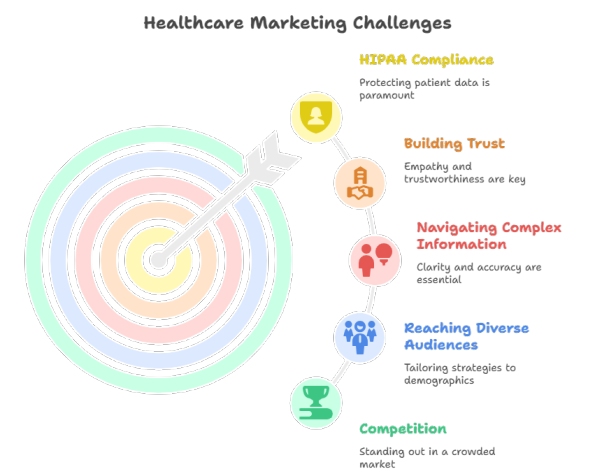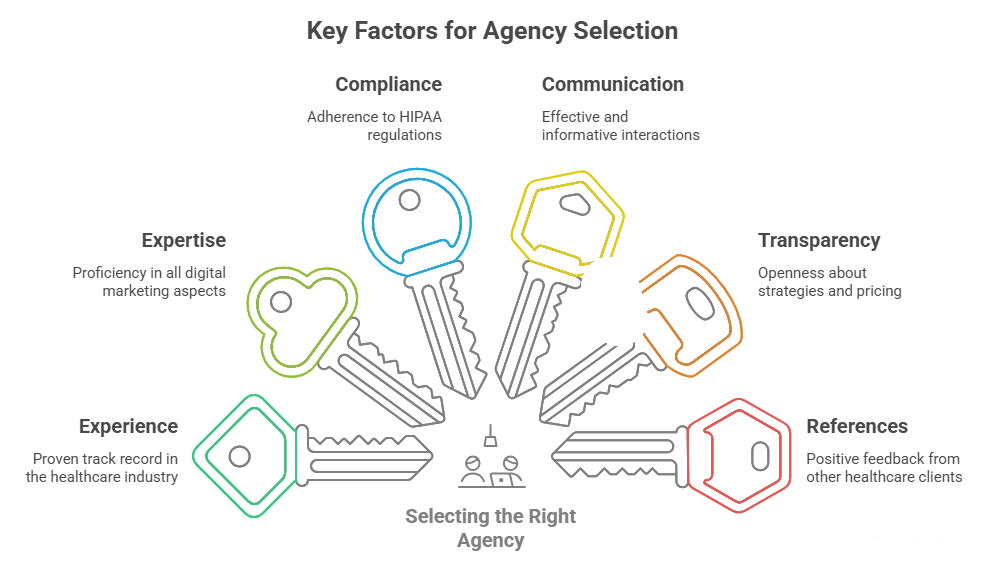
This document serves as a comprehensive guide to understanding the role, importance, and key strategies employed by a healthcare digital marketing agency. It explores the unique challenges and opportunities within the healthcare industry and how specialized digital marketing agencies can help healthcare providers and organizations thrive in the online landscape. We will delve into various aspects, including SEO, content marketing, social media, and paid advertising, all tailored to the specific needs and regulations of the healthcare sector.
The healthcare industry presents unique challenges and opportunities for digital marketing. Unlike traditional businesses, healthcare organizations must navigate strict regulations like HIPAA, maintain patient privacy, and build trust with a discerning audience. A healthcare digital marketing agency understands these nuances and can develop strategies that are both effective and compliant.
HIPAA Compliance: Protecting patient data is paramount. All marketing activities must adhere to HIPAA regulations.
Building Trust: Healthcare consumers are often anxious and vulnerable. Marketing efforts must be empathetic and trustworthy.
Navigating Complex Information: Healthcare information can be complex and difficult to understand. Content must be clear, concise, and accurate.
Reaching a Diverse Audience: Healthcare providers serve a diverse population with varying needs and preferences. Marketing strategies must be tailored to specific demographics.
Competition: The healthcare market is competitive, with many providers vying for patients’ attention.

Improved Patient Engagement: Digital marketing can help healthcare providers connect with patients and build stronger relationships.
Increased Brand Awareness: Effective marketing can raise awareness of a healthcare organization’s services and expertise.
Attracting New Patients: Digital marketing can help healthcare providers reach new patients and grow their practice.
Enhanced Patient Education: Digital channels can be used to educate patients about health conditions and treatment options.
Improved Patient Outcomes: By providing patients with the information and support they need, digital marketing can contribute to better health outcomes.
A specialized healthcare digital marketing agency offers a range of services tailored to the specific needs of the industry. These services typically include:
Keyword Research: Identifying relevant keywords that patients use to search for healthcare services.
On-Page Optimization: Optimizing website content and structure to improve search engine rankings.
Off-Page Optimization: Building high-quality backlinks from reputable websites to increase website authority.
Local SEO: Optimizing online presence for local search results to attract nearby patients.
Technical SEO: Ensuring the website is technically sound and easily crawlable by search engines.
Blog Posts: Creating informative and engaging blog posts on relevant healthcare topics.
Articles: Publishing articles on reputable healthcare websites and publications.
Infographics: Developing visually appealing infographics to communicate complex information.
Videos: Producing videos that educate, entertain, and engage patients.
Ebooks and Whitepapers: Creating in-depth resources that provide valuable information to patients.
Social Media Strategy: Developing a comprehensive social media strategy aligned with business goals.
Content Creation: Creating engaging content for social media platforms.
Community Management: Engaging with followers and building a strong online community.
Social Media Advertising: Running targeted social media ads to reach specific audiences.
Reputation Management: Monitoring online reviews and addressing patient concerns.
Google Ads: Running targeted Google Ads campaigns to reach patients searching for healthcare services.
Bing Ads: Utilizing Bing Ads to reach a wider audience.
Retargeting: Retargeting website visitors with relevant ads to encourage conversions.
Landing Page Optimization: Creating high-converting landing pages to capture leads.
A/B Testing: Continuously testing and optimizing ad campaigns to improve performance.
User-Friendly Design: Creating a website that is easy to navigate and provides a positive user experience.
Mobile Optimization: Ensuring the website is responsive and accessible on all devices.
HIPAA Compliance: Implementing security measures to protect patient data.
Content Management System (CMS): Using a CMS that allows for easy content updates.
Analytics Integration: Integrating analytics tools to track website performance.
Monitoring Online Reviews: Tracking reviews on platforms like Google, Yelp, and Healthgrades.
Responding to Reviews: Addressing both positive and negative reviews in a timely and professional manner.
Encouraging Positive Reviews: Implementing strategies to encourage patients to leave positive reviews.
Crisis Management: Developing a plan to address negative publicity and protect the organization’s reputation.
Selecting the right healthcare digital marketing agency is crucial for success. Consider the following factors:

Experience: Look for an agency with a proven track record in the healthcare industry.
Expertise: Ensure the agency has expertise in all aspects of digital marketing, including SEO, content marketing, social media, and paid advertising.
Compliance: Verify that the agency understands and adheres to HIPAA regulations.
Communication: Choose an agency that communicates effectively and keeps you informed of progress.
Transparency: Look for an agency that is transparent about its strategies and pricing.
References: Ask for references from other healthcare clients.
It’s important to establish clear metrics to measure the success of your digital marketing efforts. Key performance indicators (KPIs) may include:
Website Traffic: Tracking the number of visitors to your website.
Search Engine Rankings: Monitoring your website’s ranking for relevant keywords.
Lead Generation: Measuring the number of leads generated through digital channels.
Conversion Rates: Tracking the percentage of leads that convert into patients.
Social Media Engagement: Monitoring likes, shares, comments, and followers on social media platforms.
Return on Investment (ROI): Calculating the return on investment for your digital marketing campaigns.
By carefully selecting a healthcare digital marketing agency and tracking your progress, you can effectively leverage digital channels to reach new patients, improve patient engagement, and grow your practice.
We are a team of marketing experts working together to provide excellent services to our clients in order to ensure their business is reaching to the next level. We are committed to providing each client with creative, effective and responsive marketing & AI solutions that work with their unique business objectives, systems and resources.